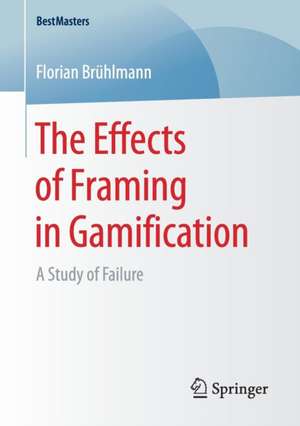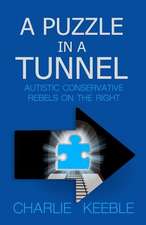The Effects of Framing in Gamification: A Study of Failure: BestMasters
Autor Florian Brühlmannen Limba Engleză Paperback – 17 ian 2017
Din seria BestMasters
-
 Preț: 364.13 lei
Preț: 364.13 lei - 13%
 Preț: 367.40 lei
Preț: 367.40 lei -
 Preț: 364.13 lei
Preț: 364.13 lei -
 Preț: 394.30 lei
Preț: 394.30 lei -
 Preț: 393.57 lei
Preț: 393.57 lei -
 Preț: 406.58 lei
Preț: 406.58 lei - 13%
 Preț: 366.14 lei
Preț: 366.14 lei -
 Preț: 367.04 lei
Preț: 367.04 lei -
 Preț: 391.40 lei
Preț: 391.40 lei -
 Preț: 346.23 lei
Preț: 346.23 lei - 13%
 Preț: 364.56 lei
Preț: 364.56 lei -
 Preț: 311.76 lei
Preț: 311.76 lei - 5%
 Preț: 403.95 lei
Preț: 403.95 lei - 13%
 Preț: 396.41 lei
Preț: 396.41 lei -
 Preț: 365.65 lei
Preț: 365.65 lei - 13%
 Preț: 365.82 lei
Preț: 365.82 lei - 13%
 Preț: 367.40 lei
Preț: 367.40 lei -
 Preț: 333.99 lei
Preț: 333.99 lei - 20%
 Preț: 366.22 lei
Preț: 366.22 lei - 13%
 Preț: 368.34 lei
Preț: 368.34 lei -
 Preț: 367.04 lei
Preț: 367.04 lei -
 Preț: 377.18 lei
Preț: 377.18 lei -
 Preț: 365.58 lei
Preț: 365.58 lei -
 Preț: 344.45 lei
Preț: 344.45 lei -
 Preț: 392.12 lei
Preț: 392.12 lei - 20%
 Preț: 292.10 lei
Preț: 292.10 lei -
 Preț: 404.04 lei
Preț: 404.04 lei -
 Preț: 251.33 lei
Preț: 251.33 lei -
 Preț: 393.57 lei
Preț: 393.57 lei -
 Preț: 344.87 lei
Preț: 344.87 lei -
 Preț: 410.77 lei
Preț: 410.77 lei -
 Preț: 411.75 lei
Preț: 411.75 lei -
 Preț: 379.30 lei
Preț: 379.30 lei -
 Preț: 411.32 lei
Preț: 411.32 lei -
 Preț: 412.89 lei
Preț: 412.89 lei -
 Preț: 377.73 lei
Preț: 377.73 lei -
 Preț: 378.12 lei
Preț: 378.12 lei -
 Preț: 412.51 lei
Preț: 412.51 lei -
 Preț: 481.79 lei
Preț: 481.79 lei -
 Preț: 377.18 lei
Preț: 377.18 lei -
 Preț: 480.06 lei
Preț: 480.06 lei -
 Preț: 376.04 lei
Preț: 376.04 lei -
 Preț: 382.95 lei
Preț: 382.95 lei -
 Preț: 377.95 lei
Preț: 377.95 lei -
 Preț: 412.68 lei
Preț: 412.68 lei -
 Preț: 376.80 lei
Preț: 376.80 lei -
 Preț: 380.45 lei
Preț: 380.45 lei -
 Preț: 410.17 lei
Preț: 410.17 lei -
 Preț: 410.94 lei
Preț: 410.94 lei -
 Preț: 380.63 lei
Preț: 380.63 lei
Preț: 375.07 lei
Nou
Puncte Express: 563
Preț estimativ în valută:
71.77€ • 74.79$ • 59.42£
71.77€ • 74.79$ • 59.42£
Carte tipărită la comandă
Livrare economică 03-17 aprilie
Preluare comenzi: 021 569.72.76
Specificații
ISBN-13: 9783658169251
ISBN-10: 3658169257
Pagini: 68
Ilustrații: XIII, 68 p. 23 illus.
Dimensiuni: 148 x 210 x 4 mm
Greutate: 0.11 kg
Ediția:1st ed. 2016
Editura: Springer Fachmedien Wiesbaden
Colecția Springer
Seria BestMasters
Locul publicării:Wiesbaden, Germany
ISBN-10: 3658169257
Pagini: 68
Ilustrații: XIII, 68 p. 23 illus.
Dimensiuni: 148 x 210 x 4 mm
Greutate: 0.11 kg
Ediția:1st ed. 2016
Editura: Springer Fachmedien Wiesbaden
Colecția Springer
Seria BestMasters
Locul publicării:Wiesbaden, Germany
Cuprins
The Perspective of Self-Determination Theory.- The Role of Context in the Perception of Feedback.- Failing and Uncertainty in Games.- Two Experiments Testing the Effects of Framing on Motivation.- Implications for Theory and Design of Gamification.
Notă biografică
Florian Brühlmann is PhD student at the HCI research group at the University of Basel, Switzerland. He is a trained psychologist with special emphasis on Human-Computer Interaction. His research interests include player experience research, questionnaire development and statistical methods for human-computer interaction research.
Textul de pe ultima copertă
The author shows that – contradicting the findings of Lieberoth (2015) – simply framing an activity as a game does not increase intrinsic motivation of the participants in a difficult puzzle task. Moreover, for participants who failed at the puzzle, it does not make any difference in terms of intrinsic motivation whether it was framed as a task, a meaningful task, a game or a test of cognitive abilities. However, perceived value of the activity and satisfaction of the need for autonomy were identified as significant predictors for completing additional rounds of the task. This lends support for the importance of the voluntariness and meaningfulness of the task to keep people engaged in gamification.
Contents
- The Perspective of Self-Determination Theory
- The Role of Context in the Perception of Feedback
- Failing and Uncertainty in Games
- Two Experiments Testing the Effects of Framing on Motivation
- Implications for Theory and Design of Gamification
Target Groups
Lecturers, students and practitioners in the fields of psychology, information technology and design
About the Author
Florian Brühlmann is PhD student at the HCI research group at the University of Basel, Switzerland. He is a trained psychologist with special emphasis on Human-Computer Interaction. His research interests include player experience research, questionnaire development and statistical methods for human-computer interaction research.
Caracteristici
Psychological Study Includes supplementary material: sn.pub/extras




